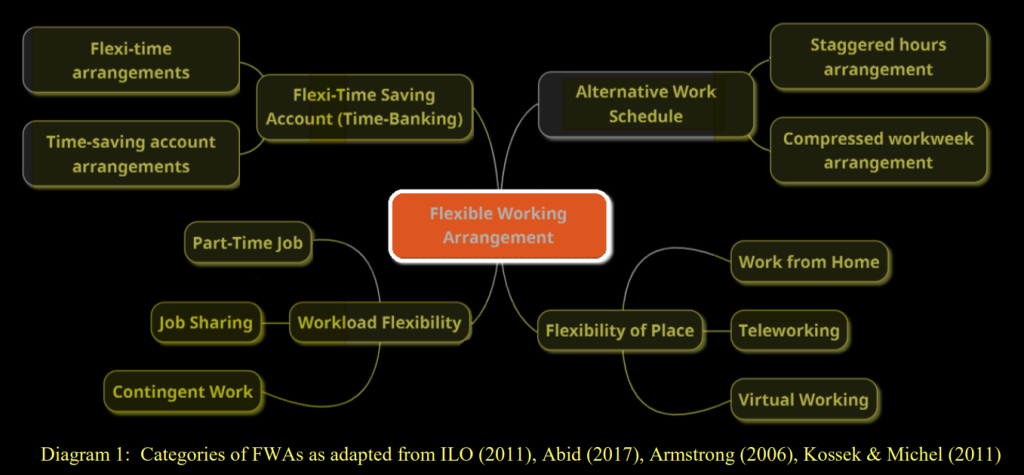Latest Update: 16-5-2022
1. The Employment (Amendment) Bill 2021 (“the Bill”) was presented on October 25, 2021.
2. Dewan Rakyat approved the Employment (Amendment) Bill 2021 on March 21, 2022.
3. Dewan Negara passed the Employment (Amendment) Bill 2021 on March 30, 2022.
4. The Employment (Amendment) Act 2022 was gazetted into law on May 10, 2022.
However, [As of 16-5-2022] the Act has not yet come into force.
[In force means that the Act or the secondary legislation has the force of law.]
1. 《2021年就业(修订)法案》(”法案”)于2021年10月25日在国会提交。
2. 下议院于2022年3月21日批准了《2021年就业(修订)法案》。
3. 上议院于2022年3月30日也通过了《2021年就业(修订)法案》。
4. 作为立法,2022年5月10日,《2022年就业(修正)法案》在宪报上颁布。
然而请注意,[截至2022年5月16日] 此法尚未生效
[生效是指该法或次级立法具有法律效力]。
Background of Flexible Working Arrangements (FWAs)
Workplaces in developed countries such as the United Kingdom, Northern Ireland, Europe, the United States of America, Australia, and New Zealand have had flexibility policies in place for quite some time.
In 1967, a company called MesserschmittBolkow-Blohm Bolkow located in Ottobrunn, Germany, was the first to use flexible working hours.
While other companies in Germany utilised a flexible working time programme, this company utilised it for a relatively substantial proportion of its employees.
As a result, in the late 1960s, this company established the scene for intense debate and implementation among many other German enterprises.
弹性工作安排(FWAs)的背景
发达国家如英国、北爱尔兰、欧洲、美国、澳大利亚和新西兰的工作场所,已经有弹性工作安排政策相当长的一段时间了。
1967年,位于德国 Ottobrunn 的一家名为 MesserschmittBolkow-Blohm Bolkow 的公司是第一家使用弹性工作时间的公司。
当德国的其他公司利用灵活的工作时间计划时,这家公司为其相当大比例的员工利用了这一计划。
因此,在20世纪60年代末,这家公司为许多其他德国企业的激烈辩论和实施创造了条件。

It has been estimated that in 1970, between 200 and 300 businesses offered flexible working hours. By 1971, this number had expanded by a factor of 10 to reach two thousand.
This mode of labour was adopted in a number of European nations, and by the year 1975, more than 30% of Switzerland’s workforce was organised in accordance with the latest model of employment.
据估计,在1970年,有200到300家企业提供灵活的工作时间。到1971年,这个数字已经扩大了10倍,达到了2000家。
这种劳动模式被一些欧洲国家采用,到1975年,瑞士30%以上的劳动力是按照最新的就业模式组织的。

It has come to everyone’s attention that the FWAs have supplanted the traditional notion of a work arrangement in many sections of developed countries.
In contrast to traditional work arrangements, which generally require employees to work at a standard period from 8 am to 5 pm, Monday through Friday, or at their usual workplace, FWA is a variable and changeable work in terms of its schedule or the nature of the working environment.
Suppose employees had access to the tools and technologies available in the workplace today. In that case, they could complete various duties even when they were not physically present at their place of employment.
大家都注意到,在发达国家的许多地区,弹性工作安排已经取代了传统的工作安排概念。
传统的工作安排一般要求员工在周一到周五的上午8点到下午5点的标准时间段内工作,或者在他们通常的工作场所工作;与此相反,弹性工作安排在时间安排或工作环境的性质上是一种可变和可改变的工作。
假设员工能够获得今天工作场所中的工具和技术,在这种情况下,即使他们不在工作地点,也可以完成各种职责。

In Malaysia’s public sector, flexible working arrangements are already in place.
And there are differences in the policies and procedures for the application of flexible working arrangements between the public and private sectors.
There are only two forms of flexible work arrangements (FWAs) that are available to civil servants in the public sector, and those are staggered working hours and Flexi-place (a work-from-home program).
In June of 2007, in compliance with the Service Circular Number 2 (Public Service Department of Malaysia, 2007), staggered working hours were implemented. This allows the public sector to provide a more flexible attendance system for civil servants.
The beginning and ending times of work for employees are flexible within a range of 7:30 a.m. to 4:30 p.m., 8:00 a.m. to 5:00 p.m., or 8:30 a.m. to 5:30 p.m., with the expectation that they will put in a predetermined total amount of time each day.
马来西亚的公共部门,已经落实弹性工作安排的措施了。
而公共部门和私人界在采用弹性工作安排的政策和程序方面却存在差异。
公共部门的公务员只有两种形式的弹性工作安排(FWAs),即错开工作时间和弹性工作地点(在家工作的方案)。
2007年6月,根据第2号服务通告(马来西亚公共服务部,2007年),实施了错开工作时间。这使得公共部门能够为公务员提供一个更灵活的考勤制度。
雇员的工作开始和结束时间在上午7:30至下午4:30,上午8:00至下午5:00,或上午8:30至下午5:30的范围内灵活安排,并期望他们每天投入的时间总量是预先确定的。

1. Some of the most significant amendments suggested to the Employment Act 1955 as a result of the Employment (Amendment) Bill 2021 (“the Bill”) include New Part XIIC – Flexible Working Arrangement
2. The Amendment Act allows an employee to submit a request for “flexible working arrangements” to change their working hours, days of the week, or place of employment.
3. This, however, is subject to the terms and conditions of the Employment Contract.
4. The employee can apply in writing, and the employer is compelled to respond either approve or reject the application within 60 days by notifying the employee in writing and stating the reason for the decision (in the case of a refusal).
5. Facebook Live 👉 https://lnkd.in/eMKwGYzD [Mandarin]
6. Join our Telegram – https://t.me/YourAuditor
🌻🌻🌻🌻🌻🌻🌻🌻
1. 2021年劳工(修正)法案对1955年劳工法令提出的一些重要修正,包括新的第XIIC部分 – 弹性工作安排
2. 修订法允许雇员提交 “灵活工作安排 “的请求,以改变他们的工作时间、每周的天数或就业地点。
3. 然而,这必须符合雇佣合约的条款和条件。
4. 雇员可以以书面形式提出申请,而雇主必须在60天内作出答复,批准或拒绝该申请,并以书面形式通知雇员,说明决定的理由(如果拒绝的话)。
🌼🌼🌼🌼🌼🌼🌼🌼🌼🌼
Employment (Amendment) Bill 2021 Series 2021年劳工(修正)法案系列
1. Amendment of Section 2 – Interpretation
[对第2条文的修正 – 定义]
https://lnkd.in/eRjMe_Ha / https://lnkd.in/eGz7Z9Dx
2. Amendment of Section 4 – Appeals
[对第4条文的修正 – 上诉]
https://lnkd.in/eP82B7WQ / https://lnkd.in/eEUfudPU
3. – Amendment of Section 18A – Calculation of Wages for Incomplete Month’s Work
[对第18A条文的修正 – 服务未满整个月的工资计算方法]
https://lnkd.in/epj-4VjE / https://lnkd.in/er9JzqCU
4. Amendment of Section 22 – Limitation on Advances to Employees
[对第22条文的修正 – 对雇员预支薪水的限制]
https://lnkd.in/emKmjpWe / https://lnkd.in/eTVDFdH7
5. Amendment of Section 25 – Wages to be Paid through Financial Institution
[对第25条文的修正 – 通过金融机构支付工资]
https://lnkd.in/eB_XgrCF / https://lnkd.in/e6WfJ2yg
6. Amendment of Section 25A – Payment of Wages other than through Financial Institution
[对第25A条文的修正 – 通过金融机构以外的方式支付工资]
https://lnkd.in/eUJMRs9R / https://lnkd.in/e3PhUw37
7. Amendment of Section 33A – Information Relating to Supply of Employees
[对第33A条文的修正 – 与雇员供应有关的信息]
https://lnkd.in/eGFCfPZW / https://lnkd.in/ebCtvCu9
8. Deletion of Part VIII on the prohibition on employing women in night work, underground work
[ 删除第八部分关于女性从事夜间工作、地下工作等的任何禁止]
https://lnkd.in/e3ktX8xi / https://lnkd.in/ee_i3eD7
9. Amendment of Section 37- Length of Eligible Period and Entitlement to Maternity Allowance
[第37条的修订 – 符合条件的时间长度和享受产假津贴的权利]
https://lnkd.in/exxNvppY / https://lnkd.in/e6hiidfN
10. New Section 41A – Restriction on Termination of Pregnant Female Employee
[新的第41A条 – 对终止怀孕女雇员雇佣合约的限制]
https://lnkd.in/e75Y3WRY / https://lnkd.in/eZs76yAr
11. Amendment of Section 42- Restriction on Termination of Female Employee After Eligible Period
[第42条的修订 – 对女性雇员在合格期限后 被终止合约的限制]
https://lnkd.in/edk6mNSu / https://lnkd.in/ezfke64k
12. Deletion of Section 44A – Application of this Part Irrespective of Wages of Female Employee
[删除第44A条 – 无论女雇员的工资如何,本部分都适用]
https://lnkd.in/eUbtB5ia / https://lnkd.in/egngtPPf
13. Amendment of Section 57 – Termination of Contract
[第57条的修订 — 合同的终止]
https://lnkd.in/eFabDdsA / https://lnkd.in/ensjPPJJ
14. Amendment of Section 57A – Employment of Foreign Domestic Employee
[第57A条的修订 — 外籍家庭雇员的雇用]’
https://lnkd.in/eNfhVrUC / https://lnkd.in/e94QMAZB
15. Amendment of Section 57B – Duty to inform Director-General of Termination of Service of Foreign Domestic Employee
[第57B条的修订 – 通知总监终止外籍家庭雇员服务的义务]
https://lnkd.in/eFyc27Wn / https://lnkd.in/eeggM_AN
16. Amendment of Section 60A – Hours of Work and Working at Night
[第60A条的修订 – 工作时间每周48改成45小时和夜间工作]
https://lnkd.in/eHJwU4T5 / https://lnkd.in/eMaDPbtX
17. Amendment of Section 60C – Shift Work
[第60C条的修订 — 轮班工作]
https://lnkd.in/eRwwe6ie / https://lnkd.in/ev42tQky
18. Amendment of Section 60F – Sick Leave
[第60F条的修订 – 病假]
https://lnkd.in/ektGrFZa / https://lnkd.in/euJUaheG
19. New Section 60FA – 7-day Paternity Leave
[新的第60FA条 – 7天陪产假]
https://lnkd.in/e4jNjTdv / https://lnkd.in/ertbkK65
20. Substitution of Section 60k – Employment of Foreign Employee
[取代第60K条 – 外国雇员的雇用]
https://lnkd.in/e_YEsZJD / https://lnkd.in/e_YEsZJD
21. New Section 60KA – Termination of Employment of Foreign Employee, etc.
[新的第60KA条 – 外国雇员的终止雇用等等]
https://lnkd.in/ebBbEQFR / https://lnkd.in/ejCpzEmb
22. Deletion of Section 60L – Director-General may inquire into Complaint
[删除第60L条 – 总监可对投诉进行调查]
https://lnkd.in/eiG7iSP8 / https://lnkd.in/eYjZDYSy
23. New Part XIIC – Flexible Working Arrangement
[新的第XIIC部分 – 弹性工作安排]
https://lnkd.in/ewW8gxqi / https://lnkd.in/e-5CYfr6
24. Amendment of Section 69 – Director General’s Power to Inquire into Complaints
[第69条的修订 – 总监调查投诉的权力]
https://lnkd.in/eDwVsqPw / https://lnkd.in/e97eY-fw
25. Deletion of Sections 69B, 69C, 69D and 69E
[删除第69B、69c、69D和69E条]
https://lnkd.in/ek-T48M7 / https://lnkd.in/eu9BRFBF
25. New Section 69F – Discrimination in Employment
[新的第69F条 — 就业中的歧视 ]
https://lnkd.in/e6_-G8rZ / https://lnkd.in/eVjS9Q7S
26. Amendment of Section 70 – Procedure in Director General’s Inquiry
[第70条的修订 – 总监调查的程序]
https://lnkd.in/e6_-G8rZ / https://lnkd.in/eVjS9Q7S
27. Amendment of Section 73 – Prohibitory Order by Director General to Third Party
[第73条的修订 – 总监向第三方发出的禁止令]
https://lnkd.in/e6_-G8rZ / https://lnkd.in/eVjS9Q7S
28. Amendment of Section 77 – Appeal Against Director General’s Order to High Court
[对第77条的修订 – 对总监的命令向高庭提出上诉]
https://lnkd.in/eqZbmb_h / https://lnkd.in/eEbjDkc3
29. Amendment of Section 81F – Offence
[第81F条的修订 – 罪行]
https://lnkd.in/eqZbmb_h / https://lnkd.in/eEbjDkc3
30. Deletion of Section 81G – Application of this Part [Sexual Harassment] Irrespective of Wages of Employee
[删除第81G条 – 无论雇员的工资如何, 本部分 [性骚扰] 都适用]
https://lnkd.in/eTsj62rE / https://lnkd.in/eJQFdzx7
31. New Section 81H – Notice on Sexual Harassment
[新的第81H条 – 关于性骚扰的告示牌]
https://lnkd.in/ejyK7uCB / https://lnkd.in/eP8GYYNT
32. Amendment of Section 82 – Service of Summons
[第82条的修订 – 传票的送达]
https://lnkd.in/eGMUvfca / https://lnkd.in/e22hZMhN
33. Amendment of Section 84 – Jurisdiction
[第84条的修订 – 管辖权]
https://lnkd.in/eG-BXhAi / https://lnkd.in/e_gTbnbT
34. Amendment of Section 86 – Saving clause as to Civil Jurisdiction of Courts
[第86条的修订 – 关于法院民事管辖权的保留条款]
https://lnkd.in/es6Qjq-A / https://lnkd.in/eHaCZbBK
35. New Section 87A – Court Order for Payments due to Employee
[新的第87A条 – 法院命令向雇员支付应付款项]
https://lnkd.in/eTGFdrP6 / https://lnkd.in/eJ9ZRA4E
36. New Section 90B – Forced Labour
[新的第90B条 – 强迫劳动]
https://lnkd.in/e_JXjVxf / https://lnkd.in/eq-VRqWU
37. Deletion of Section 93 – Offences and Penalties Under Part VIII
[删除第93条 – 第八部分规定的罪行和处罚]
https://lnkd.in/eDu2qZeK / https://lnkd.in/ebPvZFP9
38. Amendment of Section 99A – General Penalty
[第99A条的修订 – 一般处罚]
https://lnkd.in/euzRGshx / https://lnkd.in/ena5j6ZB
39. New Section 101C – Presumption as to Who is an Employee and Employer
[新条款101C – 关于谁是雇员和雇主的推定]
https://lnkd.in/e2KX3QiB / https://lnkd.in/eFHjknmX
40. Amendment of Section 102 – Regulations
[第102条的修订 – 条例]
https://lnkd.in/e8UxFucD / https://lnkd.in/e8PVAmeH
41. Saving and Transitional
[节约条款及过渡性]
https://lnkd.in/ehife2BB / https://lnkd.in/ekQAtgmJ
🌳🌳🌳🌳🌳🌳🌳🌳🌳🌳🌳🌳
👉 Stay in touch with us
1. Website ✍️ https://www.ccs-co.com/
2. Telegram ✍️ http://bit.ly/YourAuditor
3. Instagram ✍ http://tiny.cc/rojzrz
4. Blog ✍ https://lnkd.in/e-Pu8_G
5. Google ✍ https://lnkd.in/ehZE6mxy













